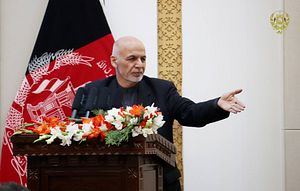In “The U.S. Needs to Talk to the Taliban” a New York Times op-ed run on March 19, Borhan Osman mistakenly reduces the popularly elected National Unity Government (NUG) of Afghanistan to one of the internal “factions.” To the contrary, the NUG enjoys a broad popular mandate and support. Like any democracy, Afghanistan is hardly devoid of political differences, which underpin the very essence of democracy: recall tensions in the U.S. two-party system or in the multiparty coalition governments of Europe.
Afghans and those they elected in the NUG firmly stand behind the grand peace offer made to the Taliban by President Ashraf Ghani. National consensus in Afghanistan demands a just, genuine peace against ongoing war and violence.
Second, by quoting a ghost website in Pakistan and referring to his unconfirmed chats with rental militants in the field, Osman inadvertently extends legitimacy to an external terror campaign, whose primary victims are innocent Afghans. Back-to-back surveys by the Asia Foundation find Afghans to be firmly behind the NUG and the continuation of the present constitutional order in Afghanistan against anything that the Taliban represents.
Directorate-S by Steve Coll elaborates on the role of Pakistan as a state sponsor of terrorism, continuing to bleed America and Afghanistan. That is why Afghans warmly welcomed President Donald Trump’s new South Asia strategy to address the root of the security problem in Afghanistan.
Third, some of the very divided Taliban factions, which Osman discusses, have begun considering peace talks, while others have welcomed the upcoming Peace Conference of Muslim Clerics (Ulema), hosted by Indonesia, in support of the Kabul Process. That is why the United States rightly refuses to talk to the divided Taliban, upholding its commitment — alongside 30 other countries and international organizations — to an Afghan-led and Afghan-owned peace process.
Hence, strategic patience — not just a few weeks of waiting — is necessary to ensure the start of a results-driven round of negotiations for a sustainable political settlement against a fragile peace deal, which Afghanistan once experienced under the 1988 Geneva Peace Accord. On March 27, the participants of the Kabul Process met again in Tashkent, Uzbekistan to discuss the way forward, in line with the provisions and principles of the announced peace offer. The Afghan Taliban must break free from foreign control and influence to embrace peace against further killing of their own long-suffering people and destruction of their beautiful homeland.
M. Ashraf Haidari is director-general of policy & strategy at the Ministry of Foreign Affairs of Afghanistan. He tweets @MAshrafHaidari

































